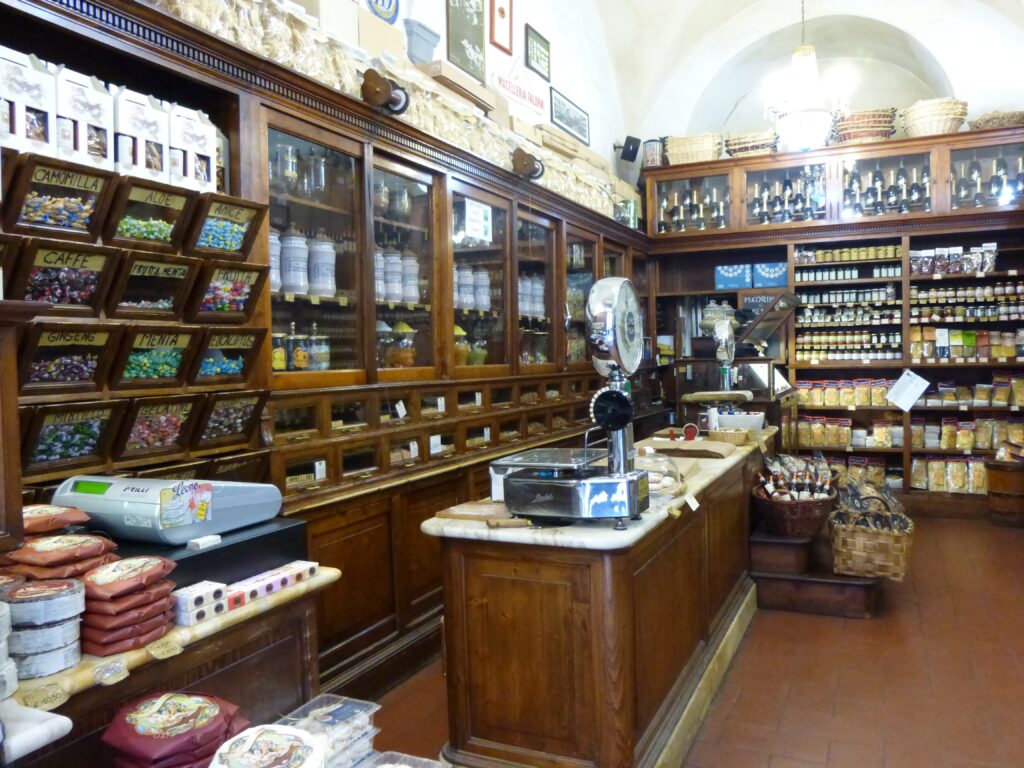The social center of the typical New England community was the general store; in New York City, our society revolved around the candy store. In Middle Village there were about ten candy stores scattered throughout the neighborhood. The candy store to which you pledged allegiance was usually the one in closest proximity to your home.
My own early life revolved around Harry and Ethyl Hellman‘s candy store on 76 street. Starting at about the age of four I was “crossed“ (assisted in crossing the street by a competent adult), and sent to play with their son Robbie, my first friend in life. We played in the store amidst the comings and goings of other Villagers. One of my earliest recollections was of Robbie‘s airplane, a pedal powered plane with a propeller that turned. I remember Robbie sitting in the plane, commanding, “Contact!“ – the signal for me to spin the propeller to get it started. At that tender age we could easily imagine that we were really flying across the Atlantic Ocean, just like Lucky Lindy.
To me, the store was a virtual wonderland. First of all, it sold every kind of delectable treat: frozen chocolate covered, marshmallow twists, tiny, pastel colored, candy buttons on paper strips, bright, red wax lips, Mello Rolls, Popsicles, ice cream Sundaes, frappes and banana splits, hot chocolate in winter, thick creamy malteds in the summer. And finally, the world-renowned New York egg cream. for a child with a sweet tooth, it was a giant cornucopia overflowing with mouth-watering temptations.
It was also, in a sense, a kind of general store for children. The school year began with a mandatory stop at the candy store to purchase supplies: a hard-covered notebook, plain brown book covers, bright yellow number two pencils, and a chunky soap eraser. During the year one would buy playtime provisions, which varied by season and gender. For boys, there were peashooters, water guns, pink Spalding balls and bags of marbles. The girls spent their pennies on jump ropes, jacks, pick up sticks, paper doll cutouts, coloring books and crayons. Yo-yos. The object of almost every child’s desire could be obtained in a well-stocked candy store.
The candy store also served as a communication center for the populace. We could find out how the outside world was faring by perusing the Daily News, The Daily Mirror. The World Telegram, and Sun. For those leaned to the left there were The New York Post, PM, and the nefarious Daily Worker for the communists among us. Of course, the New York Times and the Herald Tribune were available to the upwardly mobile and sophisticated intellectuals. I don’t recall anyone looking at the stock prices, but I am certain that some did. There must’ve been astute investors who bought AT&T, IBM and other blue chips. Even the first-generation immigrants who had not yet mastered English kept abreast of current events with the newspapers printed in their native languages of Yiddish, Italian, Russian and German.
In the 1940s it was rare to have a telephone in your own home. Often, only local tradesmen and professionals had telephones. For many of us the telephone booth in the candy store was the lifeline that extended beyond the Village’s boundaries. If you were lucky enough to be there when Harry or Ethyl answered, you were dispatched to run to Florence Kurzer‘s house, or to the house of one of the other young women to tell her that she had a phone call, probably from a guy she met, who was asking her for a Saturday night date. After she completed her phone conversation, she would reward you with a nickel tip or a dime if she was particularly pleased with the call. This was a bonanza for a little boy. Supplementing the nickel with a few more pennies meant that you could buy a hot chocolate and a few pretzels, the perfect snack to help you get through a cold winter afternoon.
Both Harry and Ethyl were very easy-going about allowing people, especially the teenage boys, to hang out in the store. As we sat around the rickety tables in the rear of the shop, we would absorb the mountains of information and misinformation that was disseminated. A few years ago, I saw a sign prominently posted in a general store in Study Butte, Texas. It read: “This is the place where brilliant minds assemble to willfully pool ignorance with questionable logic in order to reach absurd conclusions.” I guess that pretty much describes many other conversations and debates in Hellman’s.
It was there that I learned the rudiments of sexual performance from the older mentors.
It all sounded logical and very thrilling, but I secretly doubted that I could handle the mechanics as described to me since physical coordination wasn’t one of my strong points. Other conversations include seasonal sports, local gossip, real or imagined, sexual conquest, and good-natured joshing, which, in itself, was a minor rite of passage. If you survive the teasing, you had earned the right to be “knighted” with what amounted to a modern-day nickname. For example, my older brother Beral, who was always ready, willing, and able to work, was known affectionately as Cooley to emphasize his strong work ethic. These nicknames were always bestowed as terms of endearment. They were never used in a derogatory sense.
The candy store also functioned as a local entertainment center. The jukebox brought popular music into our lives; it even stirred our patriotic spirit with songs that motivated us to do our part to end the war. The lyrics of the romantic ballads of that era are still etched in my mind and come effortlessly to my lips. And I’ll bet I’m not the only one who still experiences that strong sense of patriotism upon recalling Kate Smith’s powerful rendition of “God Bless America.”
If you happen to be hanging around in the evening, Harry or Ethyl may have turned on the radio to tune in “The Jack Benny Show,” or Eddie Cantor, and everybody would laugh at the crazy antics of those talented humorists and their side kicks. In addition to the entertainment provided by the radio, we amused ourselves with our homegrown humor and practical jokes, some of which are now legendary. I can remember one with absolute clarity. The store had just received a shipment of silly black cardboard handlebar mustaches. My brother Sam convinced everyone in the store, including Ethyl, to secure one of the mustaches under their noses. When they saw someone entering, they turned their backs to the door, and as the customer entered, the entire group of mustached occupants turned to face newcomer. When the laughter subsided, the newcomer was also given a mustache. The process was repeated until there were about 30 people standing around with those ludicrous black cardboard handlebar mustaches attached to their faces.
Hellman’s really hummed on those hot summer nights before air-conditioning. Thirst quenching was serious business. Everyone had their own favorite elixir. For some it was a frigid bottle of Mission orange soda, for others. It was a slowly licked Fudgsicle. People sat around inside the store, and when the seating availability was stretched to its limits, the overflow spilled out into the street and even ended up perched on Dave Nemeth’s stoop, sipping and looking to find some measure of relief from the heat wave of those city summers. As the cool night air brought a bit of relief, I remember the young adolescents sitting around discussing their lives, their plans, their hopes, and dreams. I sometimes think it would be really a blessing, if on a balmy summer night, all the air conditioners suddenly stopped working, forcing people out of their homes and onto the front porches to seek a cooling breeze. There, perhaps in the quiet presence of their friends and neighbors, they may realize that a return to the simpler strategies might be more refreshing than a 2-ton, central air conditioner.
Wishful, but unrealistic thinking!



